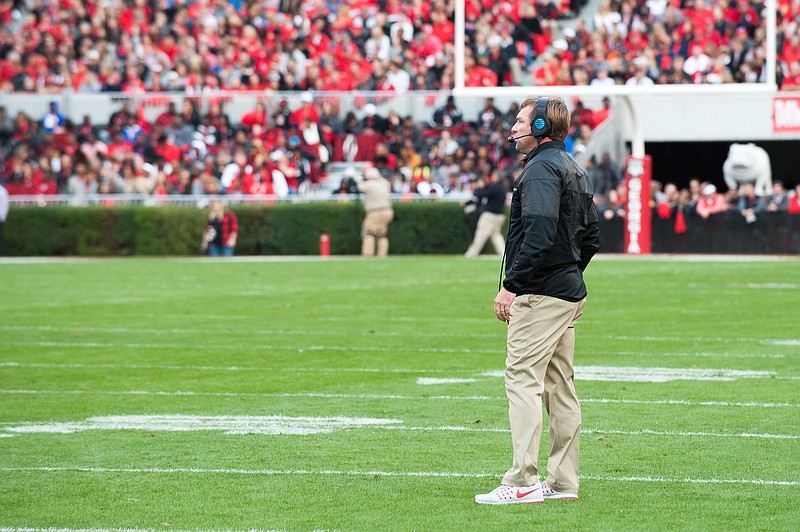Roaming charges now apply to college football coaches.
Beginning this season, any coach who leaves the white sideline and steps out on the green grass to protest an official's call will be assessed a 15-yard unsportsmanlike conduct penalty. Southeastern Conference coordinator of officials Steve Shaw went over the new rule with the 14 league coaches during the spring meetings in late May and discussed the change this week at SEC media days in Hoover, Ala.
"The goal is not to flag coaches, not in any way," Shaw said. "The goal is really to change coaching behavior. If they stay on the boundary, they'll be given all of the latitude that they've gotten over all these years, but if they come out onto the field of play, then it's going be an unsportsmanlike conduct foul."
Shaw said the change, which gained the support of the NCAA's Rules Committee and Competition Committee, will be implemented on a national level.
There is no shortage of SEC head coaches who occasionally get irate with the officials, and this new rule could increase the visibility of assistants on the sideline who also are known as "get-back coaches."
"Our coaches are going to hang on to us and make sure we don't go across that line," Georgia's Kirby Smart said. "I'm obviously concerned about this coming into play at a critical time, but it is the rule, and we follow the rules. I think as head coaches we have to set a good example, and I think that's what these rules are in place for."
Said Alabama's Nick Saban: "We've always had a get-back coach. We think we may need more than one."
When Shaw met with the coaches in Destin, Fla., he showed examples of coaches going all the way out to the hashmark to argue a call. Shaw admitted this week that officials have been too lenient and have helped let this get out of hand.
Coaches still will be allowed to walk out on the field during timeouts.
"Somebody not long ago said to me, 'You take a lot more from a coach than you ever would with a player,'" Shaw said, "and that's very true. With some of the things that we've tolerated, we would have flagged a player immediately.
"I hope what comes out of this is a little change in coaching behavior, because it's a bad day for me when we flag a coach. I have to answer a lot of questions. Hopefully it's a non-issue."
SEC coaches are paid millions to try to win as many games as possible. With this new rule, they actually could decide games with their composure or lack thereof.
And none of them want that.
"I hope that this is not a circumstance and situation that affects a game in the fall," Saban said, "because it is pretty restrictive. It is what it is. It's the same for everybody, and we're going to do the best we can to manage it."
Shaw would not guess which SEC coach could have the toughest time with the new rule but said that one of them this spring said he "might need a chain."
South Carolina's Will Muschamp is notorious for sideline outbursts and already has a plan.
"We've assigned two guys to hold me back," Muschamp said, "and one is allowed to tackle."
Contact David Paschall at dpaschall@timesfreepress.com or 423-757-6524.
